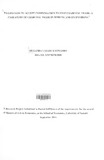| dc.description.abstract | Environmental issues are at the forefront of global media and political debates. Around the world, people are increasingly becoming aware that economic activity can generate significant environmental damages, with potentially serious repercussions for human welfare. It is increasingly recognized that forests provide a range of goods and services, some of which have significant economic value. These include fertile soil, timber, non-timber products, recreation, landscape value and a wide range of environmental benefits such as climate regulation, watershed protection and the conservation of biodiversity. Conservation of trees is a merit good with a lot of social benefits. The biggest challenge today is how to maintain equilibrium between human beings, the ecosystems and development and how to meet the needs of human beings without necessarily compromising the quality of the environment.
There is therefore a conflict between meeting the needs of human beings and conservation of trees. The general objective of the study was to estimate the value of trees around Webuye town, through determination of appropriate monetary values based on willingness to accept (WT A) compensation of charcoal traders in order to forgo trading in this product. Primary data using a questionnaire is collected from 148 respondents who are charcoal traders. A Tobit model is because the questionnaire was open-ended, eliciting a continuous variable of the amount to be compensated and the need to take care of the zero responses.
It is hypothesized that willingness to accept depends on the knowledge of charcoal traders on issues to do with environmental protection and conservation. Environmental conservation knowledge is important in informing whether the respondents will be willing to leave activities that are detrimental to the quality of the environment. The study establishes that environmental knowledge on conservation is quite significant. Another significant variable is the number of children that the respondent has in the household which has a negative relation with willingness to accept. Therefore, educating local communities on the importance of environmental conservation is important in order to built knowledge capacity to .communities on environmental issues. | en_US |

